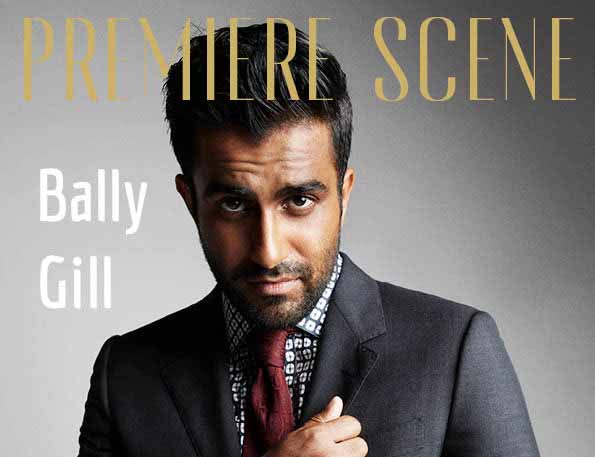
By Claire Bueno
Some of us may already recognise Bally Gill, from BBC’s Sherwood with David Morrissey and Apple TV’s Slow Horses with Gary Oldman, so you’d think he’s used to working with acting heavy weights. But then the opportunity to work with Judi Dench, Derek Jacobi, David Bradley, Russell Tovey arises. THEN add an Alan Bennett play, adapted by Call the Midwife’s Heidi Thomas, directed by Richard Eyre and there’s every reason to sing hallelujah from the top of your voice.
After interviewing Bally, it’s easy to recognise why he made the perfect casting to play the part of guardian angel Dr Valentine, he has warmth, charm and he cares. As you draw back the covers of this twee and charming hospital drama there is a vital social and political message; seriously Allelujah has more layers than Princess and the Pea and you need a lead actor that has the bravery, nuance and ability to carry it, and he does. In my previous life I worked for the NHS for 18 years, its preservation is a topic very close to my heart, but you don’t have to be an ex-NHS worker to be affected by this movie, this is a film that strikes into the very heart of humanity.
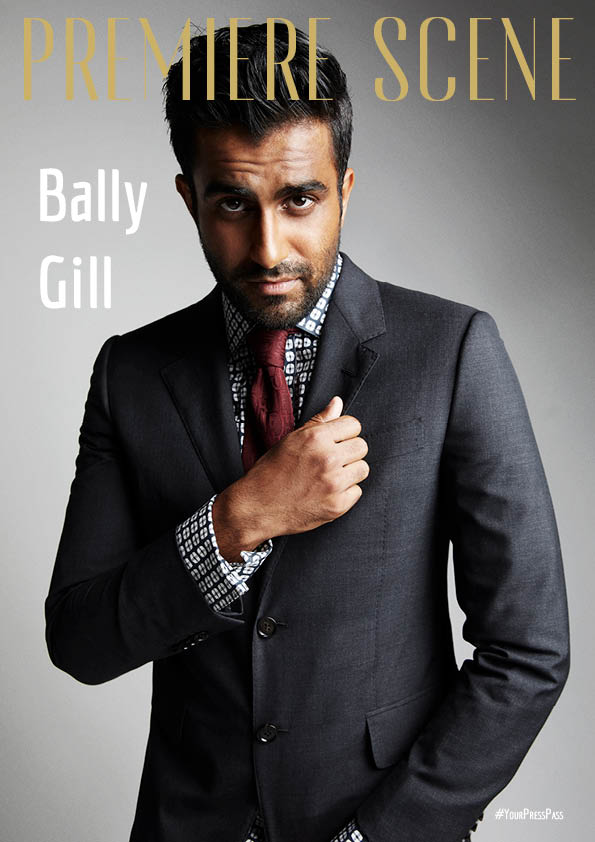
It is an outstanding film and for you as an actor it’s all about the story, so I imagine this was an opportunity that you couldn’t turn down?
Yeah, thank you very much for saying that. It was incredible, I remember when I first got it as an audition, I was given the full script. You know as an actor you only get the sides; you really don’t know what the full story is. And then when I found out what it was, and my part in it, and who else was in it, people go, ‘What interested you?’ ‘All of it!!!’ Like you said it’s not something that I’m gonna turndown. A dream come true, really.
It's told from Dr. Valentine’s point of view so we, the audience are on the journey with you, was that appealing?
Yeah, yeah, they’re completely on the journey. I think with the way you hear a lot of his voice, there’s a lot of voiceover from my character in particular. I always thought of it as more of a diary entry, it’s him expressing what he’s seeing via the patients, what he is seeing with the institution itself, and his viewpoint of a culture that he is not particularly from, because he’s from India, and him understanding what that is, and him going through it. I didn’t realise until Richard Eyre had brought it up in an interview, in terms of that different perspective and him looking in on it. And culturally the way we treat older people in this country compared to what happens in India, especially in my culture, is very different. So, I didn’t really think about that, it’s one of these things where you’re just looking at the script and you’re going through it, and you’re like, ‘Oh yeah, there’s a wider message that we’re showing as well.’
That’s interesting because for me there’s such a lot of subtext in the film. There’s obviously a political message about our NHS, and how fragile our health service is, which mirrors our respect for the elderly and how fragile they are. The text is very respectful to the elderly and not being a forgotten generation and should be cherished.
Yeah, I believe that and that was something that we were talking about in the early iterations. Richard was saying, in some of his interviews (laughs). ‘I’m old.’ This is something that affects him, that affects some of the people in the cast as well. And we’re all gonna be there at some point, we are all gonna need that service at one point, and we’re looking at it now, and seeing what’s happened to it now. What is it going to look like when we get to that age? So that was a big point of the film as well, about what quality of care, especially receiving [care]. What are they actually getting and what they do need, are all very important things in the story. And what is actually happening now, you can see being played out on the news at the moment.
Absolutely, I love the attention to detail in this film. Obviously, I have heard of St. Valentine but I looked up the meaning of the word valentine. You may have looked this up yourself, but it goes back to late Middle English, it denotes a person chosen as a sweetheart or special friend, and you know that really sums up your character, doesn’t it?
That is very good Claire, honestly, you have done your homework. I kind of guessed that, but I didn’t go into that much depth about it (laughs). He is the ideal doctor, it was something we wanted to do, Richard wanted Dr Valentine to be the perfect doctor. If you were in that situation you would want to be treated by someone like him. He’s a little naïve maybe, idealistic potentially, but his heart is in the right place, and everyone loves him; everyone really does love him. That’s what I was given and just went with that.
As an actor part of the tools of your craft is your ability to listen and respond to your scene partner, and what’s great about Dr Valentine is that he is a great listener. His ability to listen becomes pivotal to the whole course of the story, doesn’t it?
Yeah, I think that is his ultimate strength of character is that he is always wanting to learn, it’s like you said about this forgotten generation. I think what happens when we see that older generation, they are forgotten about and left to the side, and they have nothing to provide to society, and that’s actually the opposite. They’ve lived a whole life and that’s what that character is so intrigued about learning and understanding. And without giving too much away, that is ultimately how something is revealed, but I think that is a key thing. And I would like to take that in my own life actually, just to be able to listen more intently to people, but also to the older generation and I did take that into [consideration] with my own grandma really, that quality.
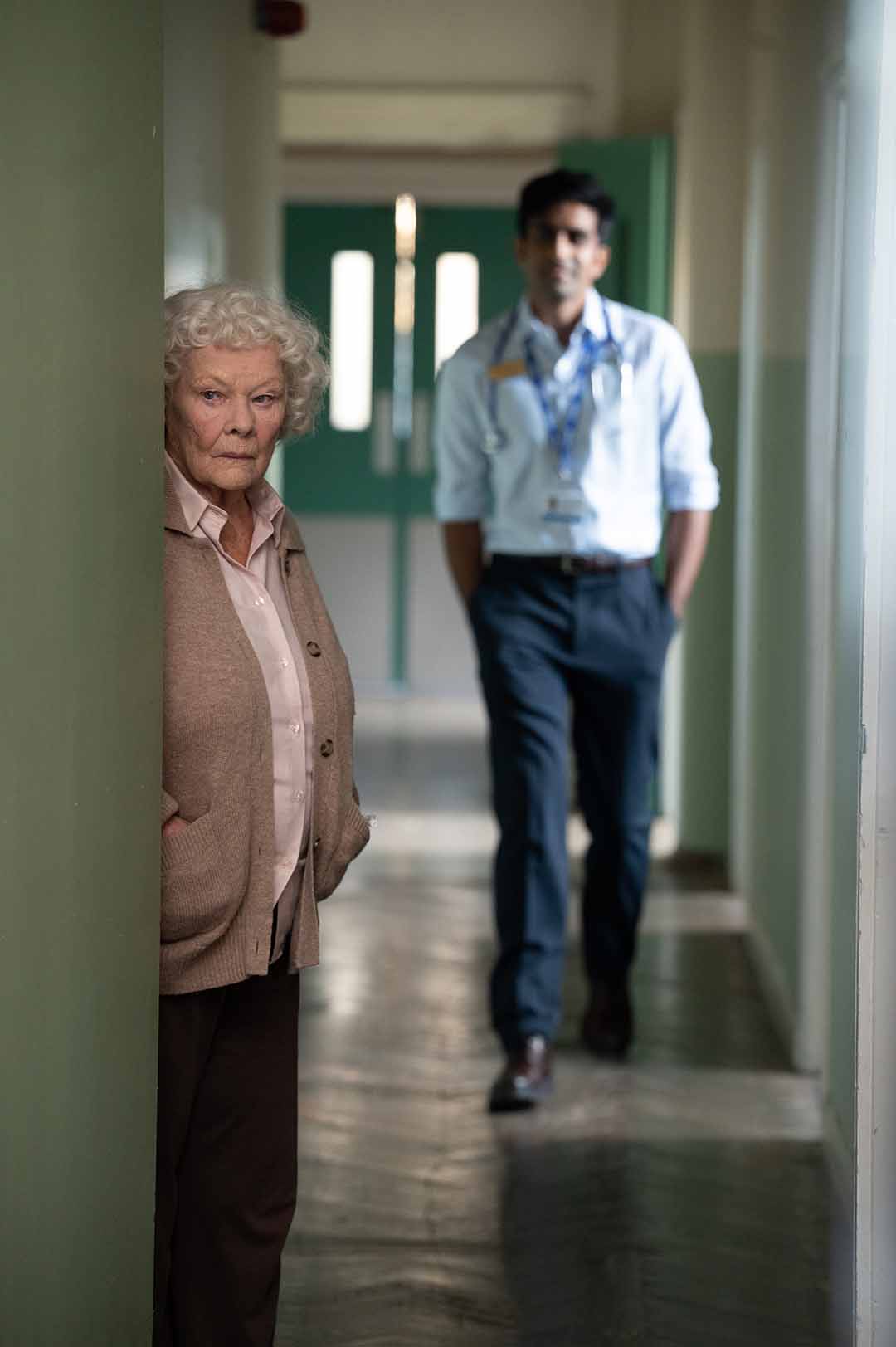
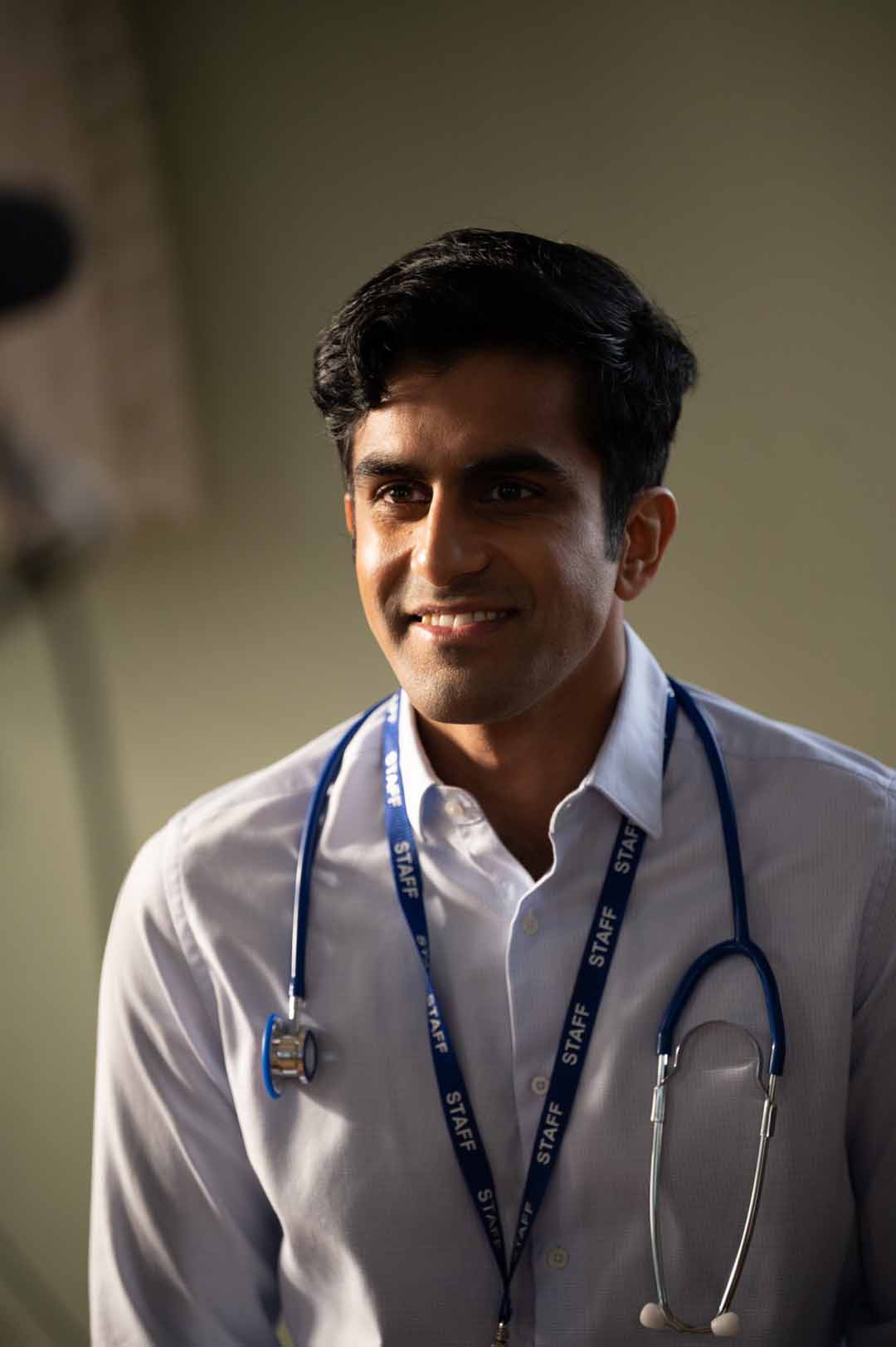
And turning up for work must have been a masterclass. We’ve got Dame Judi Dench, David Bradley, Sir Derek Jacobi, Julia McKenzie the list goes on. What a phenomenal cast!
Yeah, it was incredible, honestly. I had a lot of two handers with these incredible actors which was also a little bit daunting at the same time, you can’t really hide anywhere, you’re in with them and that’s it. I just felt blessed every time I was there really. And if it was a two hander with Jennifer Saunders, if it was a two hander with Judi Dench, David Bradley, Russell Tovey, everyone is just incredible. But everyone was so welcoming and so lovely and [they] make you feel so comfortable. I felt like I was pinching myself every time I was there. It’d just be like, ‘Oh ok, I used to watch you, I’ve studied you.’ So, I felt fortunate and grateful.
And you’re in the hands of the most phenomenal storyteller too in Richard Eyre?
Yeah, Richard was honestly so pivotal to the whole piece and was really encouraging. He knew that this was my first feature film, one of my first leads in anything on TV and film. He was just a dream to work with and [I] never felt like he made me feel, ‘You don’t know what you’re doing.’ He was just wonderful, honestly and an incredible director and a really good friend.
And what’s great about the film is that it’s funny, as much as there are moments of real pathos, it’s funny.
I mean Alan Bennett is incredible firstly [that] Northern dry, dark humour, but also very heart-warming as well, and with Heidi Thomas adapting the piece for film. I had never done an Alan Bennett play before or film, so it was me learning the style of it, and where I fit in it, but it is incredibly funny and quick witted. I didn’t get as much of that, I got more of the heart-warming, touching moments and I was more the straight one, the backbone of it, telling the story. Because I remember people going, ‘It’s really, really funny.’ I was like, ‘Which bits? Which bits are funny? I’ve not seen any bit.’ And then I watched the whole piece, I was like, ‘Oh my God this is hilarious.’ Watching it in a cinema by myself before we were going to do some press dates, laughing just by myself and I was like, ‘This is brilliant, this is an amazing film.’
“There was a responsibility to give a voice to those professionals. Doctors, nurses, anyone in the profession, that voice that you don’t really get to hear.”
And the opportunity that you get is to deliver the most powerful monologue at the end of the film. What was it like preparing for that as films are not shot chronologically. Was it shot at the beginning to get it out of the way, or was it shot at the end allowing you to build momentum?
We filmed that pretty much towards the end and I’m glad that we did it that way because I was quite nervous about that speech, especially when it’s to camera and we did it in one shot, the whole way through. So, if there’s any mistake you have to go right back to the beginning. Without wanting to give too much away, it was something that I was really passionate about, cos there was a responsibility to give a voice to those professionals. Doctors, nurses, anyone in the profession, that voice that you don’t really get to hear. Usually in news outlets it’s more about them being talked about, the statistics, lack of jobs, lack of funding and underpaid. Where actually we don’t really get to hear their personal voice, we don’t get to hear them. So that was something that was really important to me. And as an actor you just wanna give that justice, you want to make sure you get that right for them, as much as anyone really.
What was it like breaking that fourth wall and having to look down the barrel of the lens cos that’s normally a big no, no for screen acting (laughs).
(Laughs) I ’ll be honest it did feel a little uncomfortable. What is it? The number one rule of acting for screen? Don’t look at the camera lens. But it does really lend itself to the whole piece, and also it has got that theatre element in it because it was a play; this film was a play before, they had done at Bridge [Theatre]. In theatre if you are doing Shakespeare or whatever, a direct address to the audience is really important, and it did have that element. I felt a bit more comfortable doing that bit, coming from stage, coming from theatre, and in that kind of context I’d be like, ‘Am I supposed to be doing this? Is this right? OK.’ But it was really incredible and really touching. It was just incredible to watch the whole component of that come together. Those days take the whole day to get, I think 30 seconds or 40 seconds [would] take the whole day to make, but I loved it, honestly loved it.
What have you taken away with you from being in Allelujah? Has there been an experience or is there something about your craft that you can take away with you for the future? Or a lasting memory maybe?
There’s loads, it’s really hard to quantify it. I think the experience of actually doing a film like that and to be in a production like that. But also, it’s about our healthcare system. I think ultimately, it’s about what’s happened to it, what’s gonna happen to it and if we don’t do something about it. I mean people are dying now anyway, I think it’s just going to get worse unless we do something about it. And people shouldn’t be forgotten, and they should feel that we can care for people in whatever capacity we can. So, I think I’ve got more of an appreciation for that, and for our healthcare system. I hope we can do something to elevate that strain on it, or the government should (laughs) without getting too political.
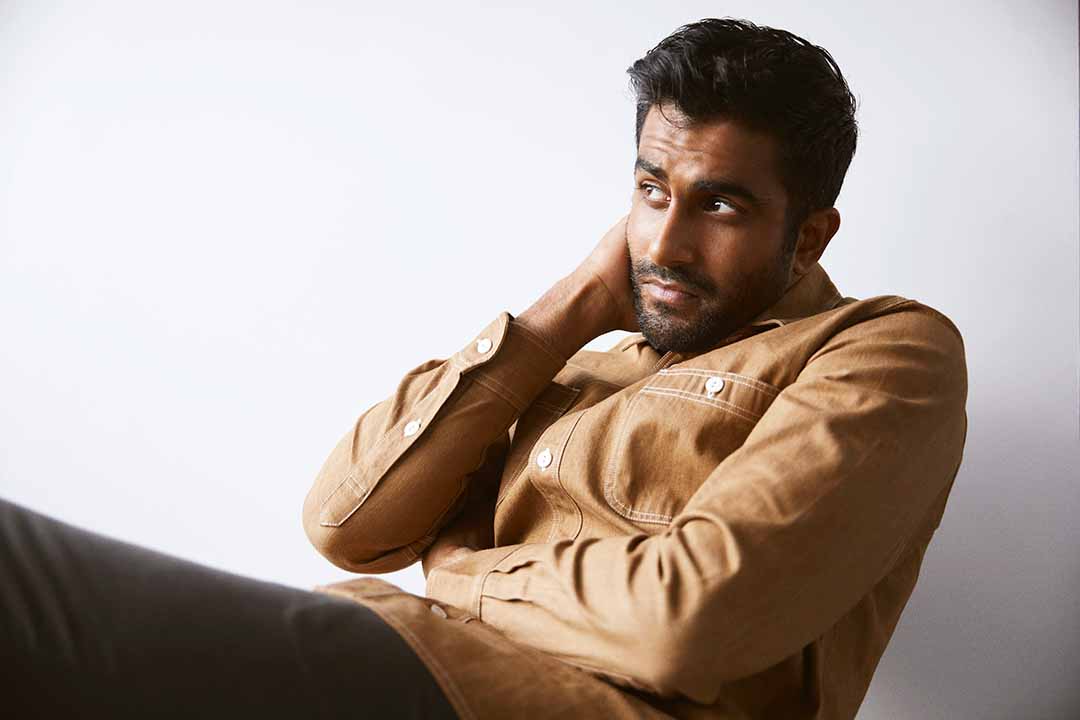
BALLY GILL
stars in
Allelujah
in cinemas in the UK and Ireland on 17 March 2023
Credits
Photographer: David Reiss | Production Stills: Pathé
With special thanks to SATELLITE414
Allelujah - Official Trailer
Claire Bueno
Claire Bueno is a film journalist, presenter and interviewer, having moderated BAFTA, Royal Television Society (RTS), Women in Film and Television (WFTV), and Apple Store Q&As and hosted Comic Con panel talks. Claire is the founder of Premiere Scene Magazine and has had the privilege of interviewing esteemed artists including Tom Cruise, George Clooney, Brad Pitt, Sir Anthony Hopkins, Sigourney Weaver, Emily Blunt, Samuel L Jackson, James Cameron and Andy Serkis.
As a media coach Claire works with leading personal publicists, HBO, Netflix, Sky, ITV, Penguin Random House, the BFI, DDA, MacMillan and Premier, offering practical coaching sessions and safe environment for talent to perfect their interview technique before facing the press. She has extensive experience working with emerging and seasoned professionals and where English is not their first language.
Additionally, Claire is the producer of the critically acclaimed feature documentary CLEANIN’ UP THE TOWN: Remembering Ghostbusters and the upcoming TOO HOT TO HANDLE: Remembering Ghostbusters II.
